Embracing Remote Mental Health Care During Times of Change
Life transitions such as loss, medical diagnoses, or financial challenges can trigger significant emotional distress. Amid these shifts, managing mental health often involves medication adjustments tailored to individual needs. Advances in telehealth and centralized mental health services now allow patients to receive comprehensive care, including medication management, without in-person visits. This article explores how remote medication adjustment supports those facing life changes, emphasizing personalized care, the variety of treatment options, and strategies to optimize recovery and wellbeing.
Comprehensive Mental Health Services for Anxiety and Depression
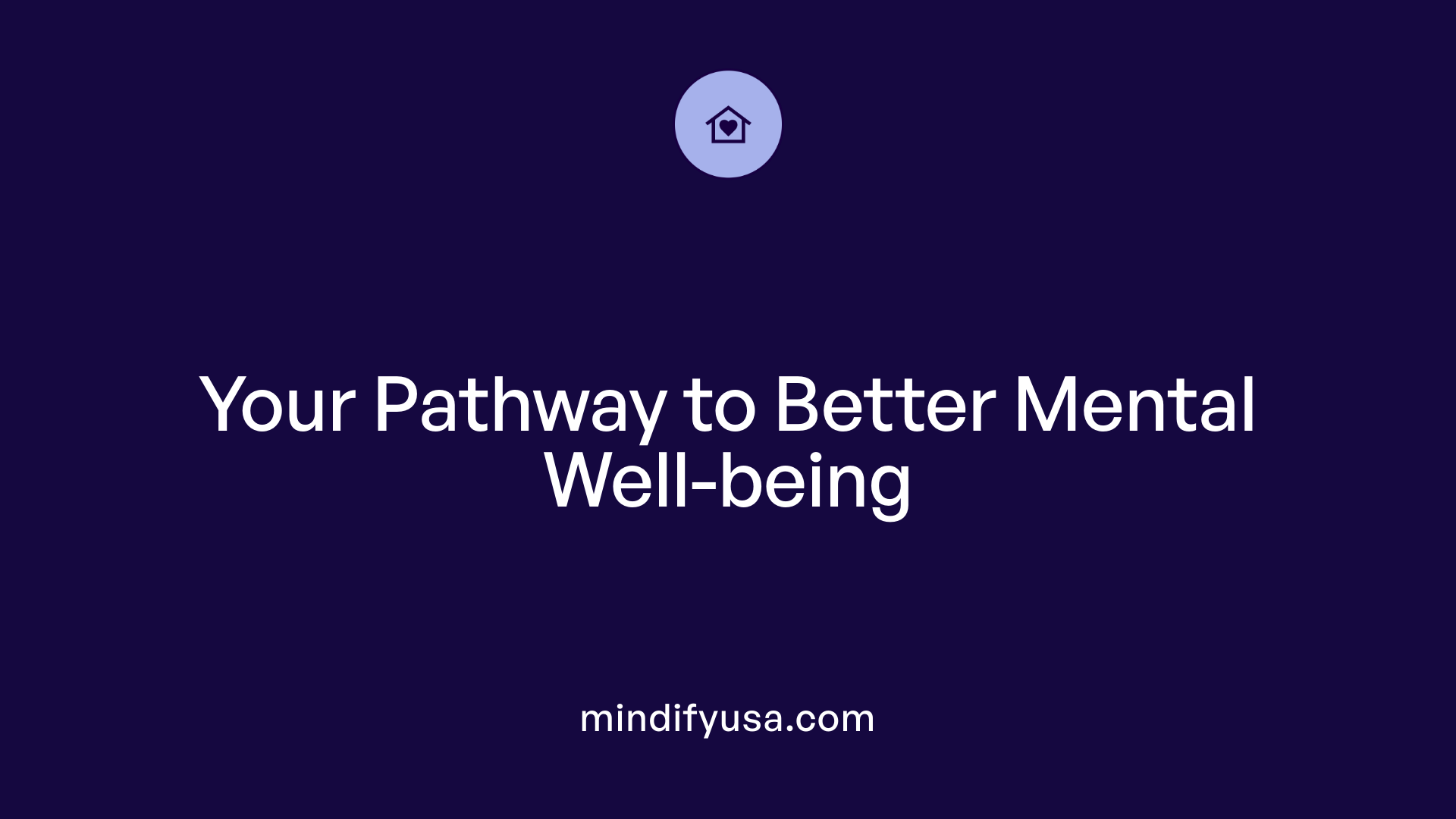
What comprehensive mental health services are typically offered for conditions like anxiety and depression?
Comprehensive mental health care for anxiety and depression starts with a thorough psychiatric evaluation. Psychiatrists assess medical history, symptoms, and lifestyle to develop a personalized treatment plan.
Psychotherapy is a cornerstone of treatment, often utilizing cognitive-behavioral therapy (CBT) to help patients understand and manage negative thoughts and behaviors. Talk therapies may be individual, group, or family-based, providing emotional support and coping skills.
Medication management plays a critical role, involving prescriptions tailored to the individual’s needs. Antidepressants like SSRIs and SNRIs are commonly used, with adjustments made through ongoing monitoring to enhance effectiveness and minimize side effects.
Supportive therapies include crisis intervention resources like the 988 Suicide & Crisis Lifeline and programs promoting prevention and recovery, such as Substance Use & Misuse Prevention Month and RecoverMe.
Services occur in various settings—from outpatient clinics and community-based programs to inpatient units and emergency departments—ensuring accessibility across different levels of care. Integrated behavioral health setups and centralized intake processes facilitate coordination and continuity, enhancing recovery outcomes.
Together, these components form a holistic, patient-centered approach to managing anxiety and depression effectively.
Role and Types of Medications in Mental Health Treatment
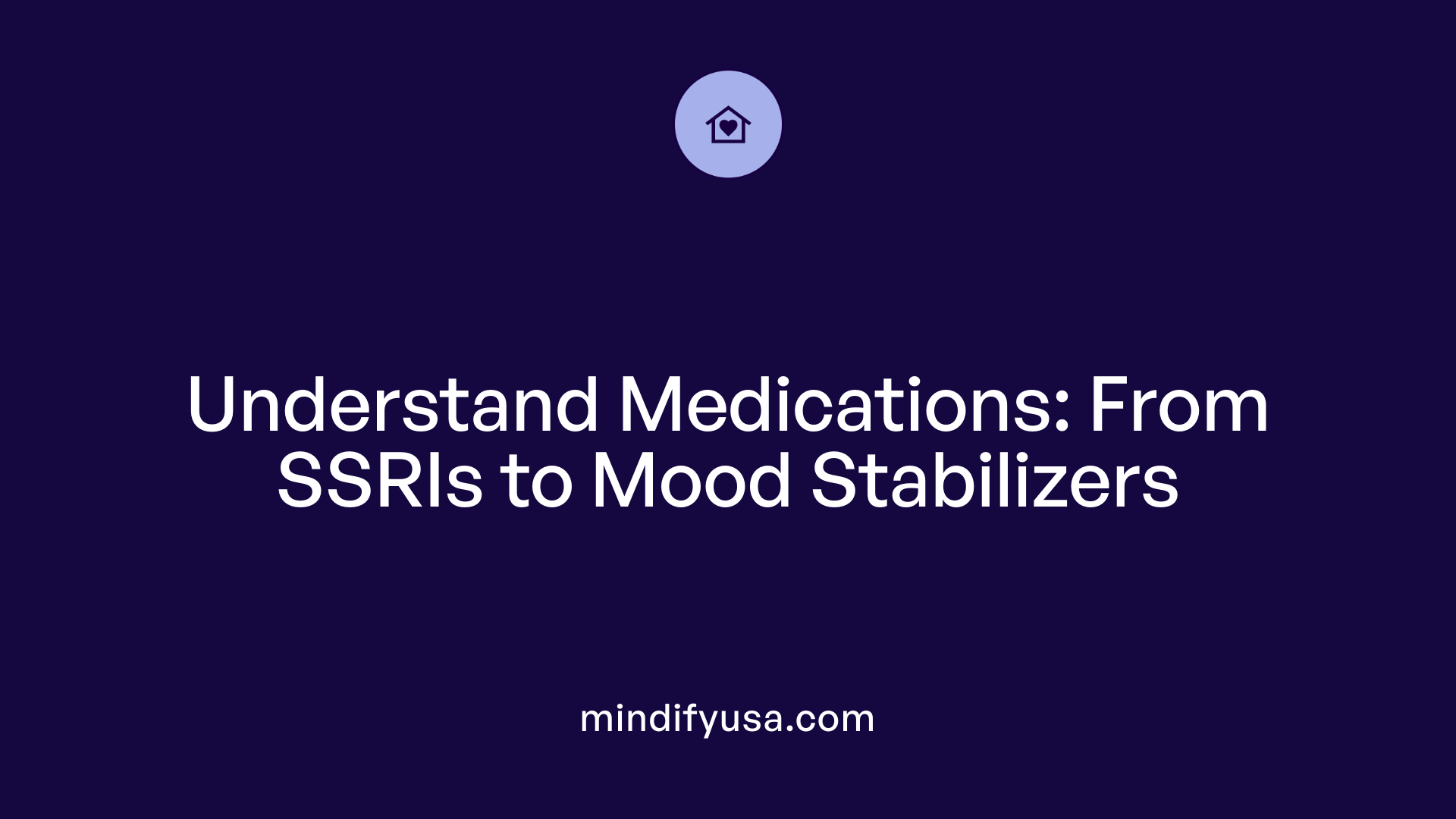
How Are Medications Used in Mental Health Treatment?
Medications are an essential component in treating mental health disorders and are often combined with psychotherapy and other therapies for better outcomes. They help adjust brain chemistry to alleviate symptoms, improve functioning, and support long-term recovery. Treatment plans are personalized, considering medical history and lifestyle, and require ongoing evaluation and dose adjustments by psychiatrists to maximize effectiveness and minimize side effects.
What Types of Antidepressants Are Commonly Prescribed?
Antidepressants play a vital role in managing conditions like depression and anxiety. Common classes include:
- Selective Serotonin Reuptake Inhibitors (SSRIs): Focus on increasing serotonin levels.
- Serotonin-Norepinephrine Reuptake Inhibitors (SNRIs): Target both serotonin and norepinephrine.
- Norepinephrine-Dopamine Reuptake Inhibitors (NDRIs): Affect norepinephrine and dopamine.
These medications generally take 4 to 8 weeks to show significant improvement, with side effects typically mild and transient.
What Anti-Anxiety Medications Are Available?
Anti-anxiety treatment includes:
- SSRIs and SNRIs for long-term anxiety management.
- Benzodiazepines and beta-blockers to provide rapid but short-term symptom relief.
- Buspirone, which offers a non-benzodiazepine option for longer-term treatment.
The choice depends on the severity and nature of symptoms, with careful monitoring to avoid dependence or side effects.
How Are Mood Stabilizers Used?
Mood stabilizers, such as lithium, are primarily used for bipolar disorder. They help regulate mood swings and require regular monitoring for safety and effectiveness. Adjustments to dosage are common to balance therapeutic benefits against potential side effects.
What Are Antipsychotic Medications?
Antipsychotics treat psychotic symptoms seen in disorders like schizophrenia and bipolar disorder. They are divided into:
- First-generation (typical) antipsychotics: Older drugs with more movement-related side effects.
- Second-generation (atypical) antipsychotics: Newer medications with a different side effect profile.
Both types need careful management and monitoring.
What Role Do Stimulants Play?
Stimulant medications are prescribed mainly for attention deficit hyperactivity disorder (ADHD) and narcolepsy. They enhance alertness and focus and are safe under medical supervision. Proper management ensures efficacy while reducing potential abuse or side effects.
| Medication Type | Common Uses | Key Considerations |
|---|---|---|
| Antidepressants | Depression, Anxiety | Delayed onset (4-8 weeks), mild side effects |
| Anti-anxiety Drugs | Anxiety Disorders | Short vs. long-term treatments, risk of dependence |
| Mood Stabilizers | Bipolar Disorder | Regular blood monitoring required |
| Antipsychotics | Psychosis, Schizophrenia, Bipolar | Distinct side effects for typical vs. atypical drugs |
| Stimulants | ADHD, Narcolepsy | Requires close supervision to avoid misuse |
Understanding Adjustment Disorder in the Context of Life Changes
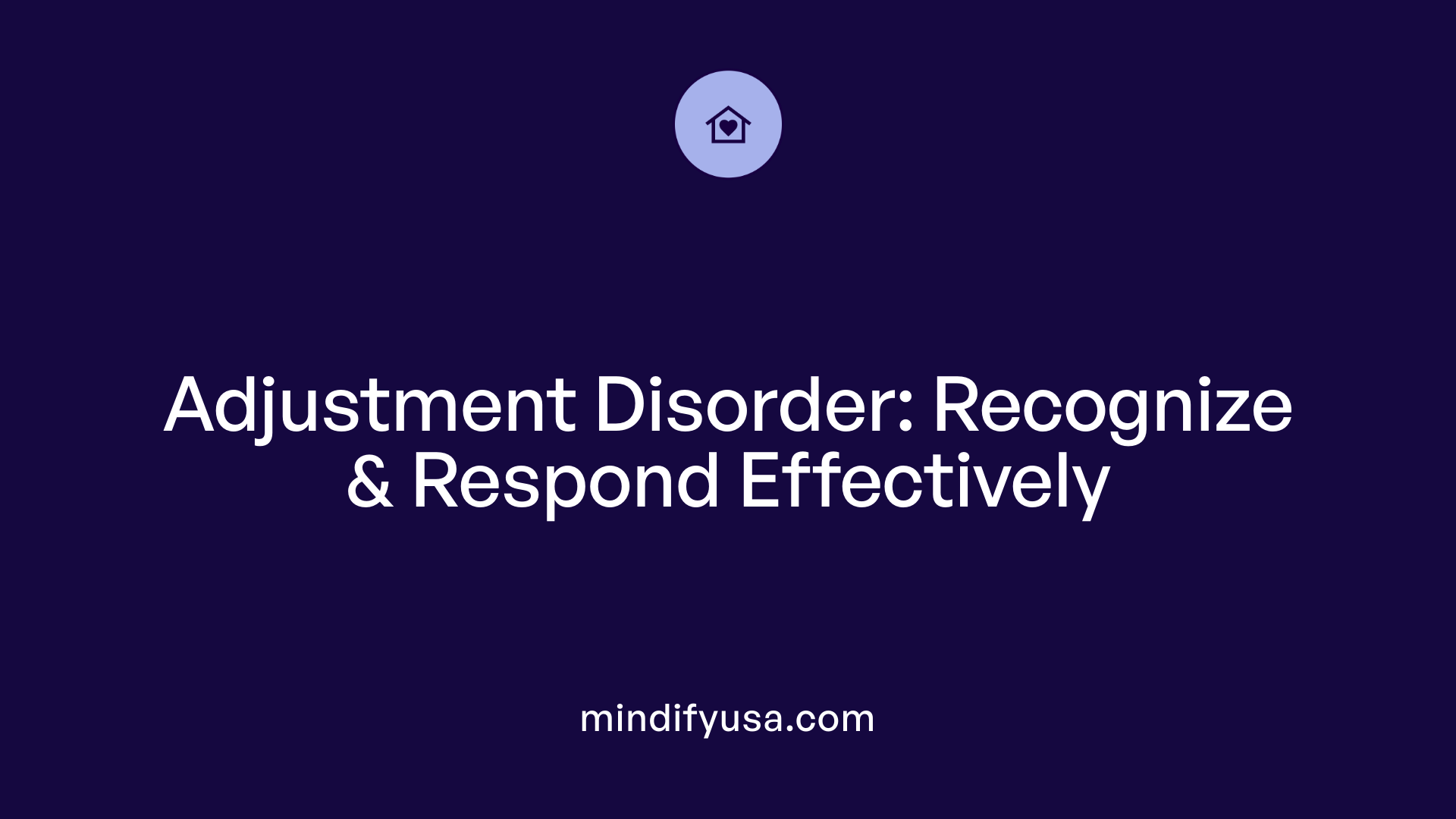
What is Adjustment Disorder?
Adjustment disorder is a short-term emotional or behavioral response to a stressful life event or change. It typically manifests as feelings of depression, anxiety, restlessness, or impulsivity that arise following a significant stressor. These reactions are more intense or prolonged than typical stress responses but generally last less than six months.
What Common Stressors and Triggers Lead to Adjustment Disorder?
Stressors triggering adjustment disorder are highly personal but often include major life changes such as the death of a loved one, relationship breakups, new medical diagnoses, financial difficulties, or environmental disasters. Triggers can also be sensory reminders like seeing certain photos, hearing specific songs, or encountering smells tied to the stressful event.
What Are the Symptoms and Types of Adjustment Disorder?
Symptoms vary widely, from emotional signs like depression and anxiety to physical complaints such as headaches, stomach aches, fatigue, or heart palpitations. Clinically, adjustment disorder is categorized into six types based on dominant symptoms:
- With depressed mood
- With anxiety
- With mixed anxiety and depressed mood
- With disturbed conduct
- With disturbed emotions and conduct
- Unspecified type
How Long Does Adjustment Disorder Last and What is Its Prognosis?
Adjustment disorder symptoms typically persist for less than six months (short-term or acute). If symptoms extend beyond six months, the disorder may be classified as chronic. With early intervention including psychotherapy—such as cognitive behavioral therapy—and, when appropriate, medication for symptom relief, most individuals recover fully. Supportive therapies help in recognizing negative thought patterns and foster better coping strategies, reducing the risk of developing longer-term mental health issues.
Medication Use for Adjustment Disorder Symptoms

What medications are prescribed for adjustment disorder?
Adjustment disorder symptoms, such as depression and anxiety, can be managed with medications including antidepressants and anti-anxiety drugs. Antidepressants commonly prescribed include SSRIs (selective serotonin reuptake inhibitors) and SNRIs (serotonin-norepinephrine reuptake inhibitors), which help regulate mood and emotional responses. For symptoms requiring immediate relief, benzodiazepines—a class of anti-anxiety medications—may be used short-term to ease intense anxiety or restlessness.
How do antidepressants and anti-anxiety drugs help with short-term symptom relief?
Antidepressants typically take about 4 to 8 weeks to provide noticeable symptom improvement, as they alter neurotransmitter activity gradually. In contrast, anti-anxiety drugs like benzodiazepines can reduce acute symptoms quickly but are not recommended for long-term use due to risks of dependence. Buspirone is another anti-anxiety medication suitable for longer-term management, acting without the sedation common to benzodiazepines.
What caution is advised when discontinuing these medications?
Medications for adjustment disorder require careful management, especially when discontinuing. Abruptly stopping antidepressants or anti-anxiety drugs can trigger withdrawal symptoms or a return of anxiety and depression symptoms. Healthcare providers recommend a gradual tapering schedule and close monitoring to minimize adverse effects and ensure safe discontinuation.
By combining medication with supportive psychotherapy and lifestyle adjustments, patients with adjustment disorders can achieve effective symptom relief and improved coping strategies.
Personalized Medication Management and Remote Care
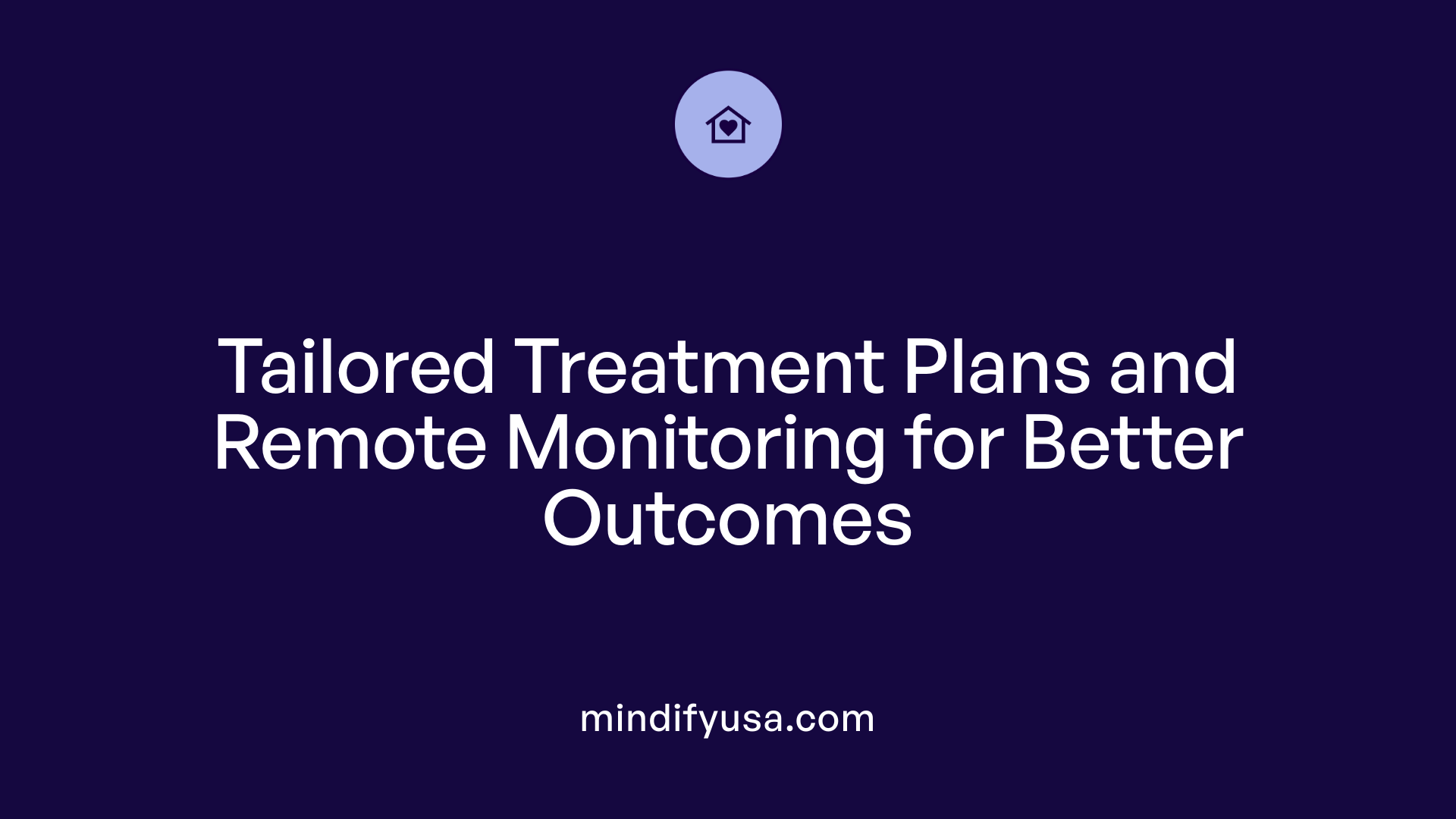
How are psychiatric evaluations used in medication management?
Psychiatrists carry out thorough evaluations that encompass a person's medical history, current symptoms, and lifestyle factors. These assessments form the foundation for developing effective and personalized treatment plans.
Why is tailoring medications to individual needs important?
Medication management is most effective when treatments are customized. Psychiatrists adjust prescriptions and dosages based on patient response to enhance benefits and reduce adverse effects.
How do genetics and lifestyle impact psychiatric medication?
Genetic makeup can influence how a patient metabolizes and responds to medications. Additionally, lifestyle factors such as diet, sleep quality, and stress levels are considered to optimize therapeutic outcomes in mental health treatment.
What role does ongoing monitoring and dose adjustment play?
Continual monitoring allows psychiatrists to track progress, manage side effects, and modify treatment plans efficiently. This iterative process ensures that medication remains effective and tolerable over time.
Why is the patient-psychiatrist relationship crucial?
A trusting and communicative relationship between patient and psychiatrist encourages adherence, enables open discussion about symptoms and side effects, and supports a collaborative approach to medication management.
How does telehealth integrate with medication management?
Remote care via telehealth has become a viable alternative to in-person treatment, showing comparable improvements in symptom reduction and quality of life. Telehealth supports longer treatment engagement for some patients, making personalized care more accessible and flexible.
Telehealth as a Viable Platform for Mental Health Medication Adjustment

How effective is telehealth for mental health medication adjustment?
Telehealth has proven to be an effective alternative to in-person mental health treatment, including medication management. During the COVID-19 pandemic, telehealth services allowed psychiatrists to conduct comprehensive evaluations, adjust prescriptions, and monitor patient progress remotely. This ensured continuity of care and personalized treatment plans tailored to individual responses and lifestyle factors, crucial elements in medication adjustment.
How does telehealth compare with in-person mental health treatment?
A large-scale study comparing telehealth during the pandemic with pre-pandemic in-person treatment found no significant difference in patient outcomes. Both groups showed similar improvements in depressive symptoms and quality of life. This comparability extends to medication management, where ongoing dose adjustments and side effect monitoring were effectively performed via telehealth.
What impact does telehealth have on treatment engagement and outcomes?
Interestingly, patients receiving partial hospitalization (a more intensive treatment level) via telehealth stayed on average 2.8 days longer than those treated in-person. This suggests telehealth platforms may foster longer engagement in treatment, potentially leading to better adherence and outcomes. The flexible access to psychiatric care supports sustained medication supervision and integration with therapies like cognitive behavioral therapy.
What clinical symptom improvements are observed with telehealth?
Both telehealth and in-person groups experienced significant improvements measured by validated tools such as the Quick Inventory of Depressive Symptomatology-Self Report (QIDS-SR) and Quality of Life Enjoyment and Satisfaction Questionnaire (Q-LES-Q). Effect sizes indicated moderate to high clinical significance, highlighting telehealth’s role in effective symptom reduction and quality of life enhancement through medication management and therapeutic support.
Integrating Psychotherapy and Medication During Remote Treatment
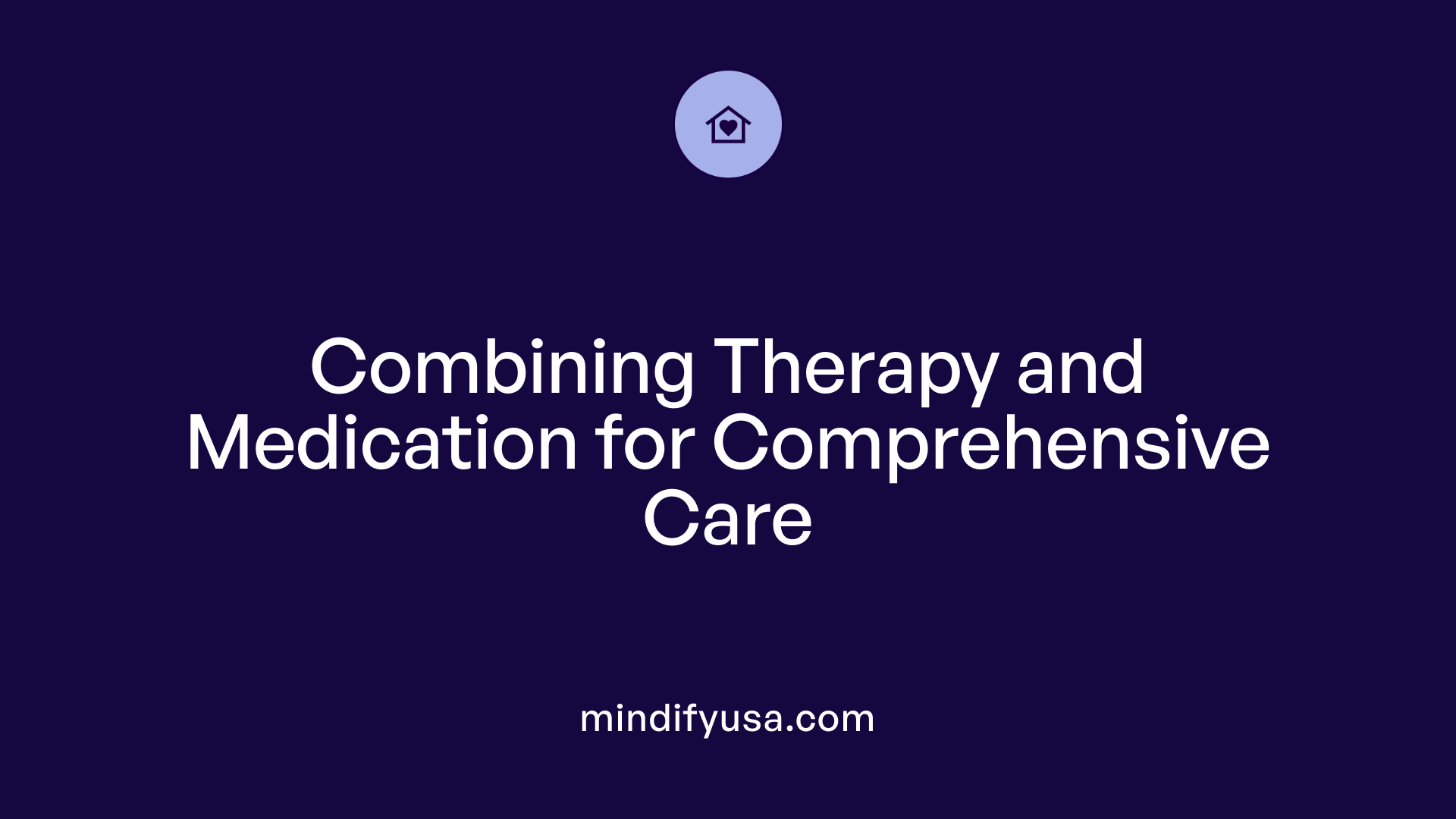
How is Cognitive Behavioral Therapy Combined with Medication?
Cognitive Behavioral Therapy (CBT) is often integrated with medication to provide comprehensive treatment for mental health conditions such as anxiety and depression. Medication helps to stabilize mood and reduce symptoms, while CBT equips patients with coping skills and strategies to manage negative thoughts and behaviors. This combined approach allows for personalized care, addressing both biological and psychological aspects of the disorder.
How is Psychotherapy Delivered Remotely?
With advancements in telehealth, psychotherapy, including CBT, can be effectively delivered remotely. Telehealth sessions enable patients to receive therapy from the comfort of their homes, increasing access and convenience. Studies have shown that remote treatment produces symptom improvements comparable to in-person therapy. Additionally, telehealth has been associated with longer engagement in intensive care, such as partial hospitalization programs.
What are the Benefits of Integrated Treatment for Anxiety and Depression?
Integrating medication with psychotherapy like CBT yields several benefits for patients with anxiety and depression:
- Enhanced symptom reduction: Medication acts on neurochemical imbalances while CBT addresses thought patterns.
- Personalized care: Treatment plans can be adjusted based on individual response and preferences.
- Increased treatment adherence: Combining modalities can improve motivation and support.
- Flexibility: Remote delivery allows continuous care regardless of location or circumstances.
This holistic approach fosters improved emotional well-being and helps patients develop long-term resilience against mental health challenges.
Addressing Side Effects and Patient Adherence Remotely

What are common medication side effects?
Many psychiatric medications, including antidepressants and anti-anxiety drugs, typically cause mild side effects that tend to improve over time. For antidepressants such as SSRIs, SNRIs, and NDRIs, side effects can include nausea, headaches, and sleep disturbances. Benzodiazepines may cause drowsiness or dizziness. Monitoring these side effects is essential to ensure patient comfort and successful treatment.
How are side effects managed through telehealth?
Telehealth enables continuous and accessible monitoring of medication side effects without the need for in-person visits. Patients can report symptoms via virtual appointments, allowing psychiatrists to adjust dosages or switch medications promptly. Telehealth platforms also provide educational resources that help patients understand and manage side effects effectively from home.
Why is adherence and follow-up important?
Adherence to prescribed medication is critical for effective mental health treatment. Consistent follow-up ensures that medication efficacy is evaluated and side effects are minimized. Telehealth facilitates regular check-ins, fostering a trusting relationship where patients feel comfortable discussing challenges, reducing the risk of non-adherence.
What strategies support patient engagement in remote care?
Engagement strategies include personalized medication management, clear communication about treatment plans, and setting realistic expectations regarding medication onset and side effects. Encouraging patients to prepare questions before appointments and involving family support through virtual sessions enhance adherence. Additionally, combining medication with psychotherapy via telehealth promotes a holistic, patient-centered approach.
| Aspect | Description | Benefit to Patient |
|---|---|---|
| Side Effects Monitoring | Regular symptom reporting using telehealth platforms | Early detection and management of side effects |
| Personalized Treatment | Tailoring medication and doses based on patient response | Optimized treatment efficacy and minimized risks |
| Continuous Follow-up | Scheduled virtual check-ins | Increased patient adherence and support |
| Patient Education | Providing accessible resources on side effects and medication use | Empowered patients with better self-management |
| Integrated Therapy | Combining medication with psychotherapy through telehealth | Comprehensive care improving overall outcomes |
Crisis Intervention Resources and Remote Support Systems
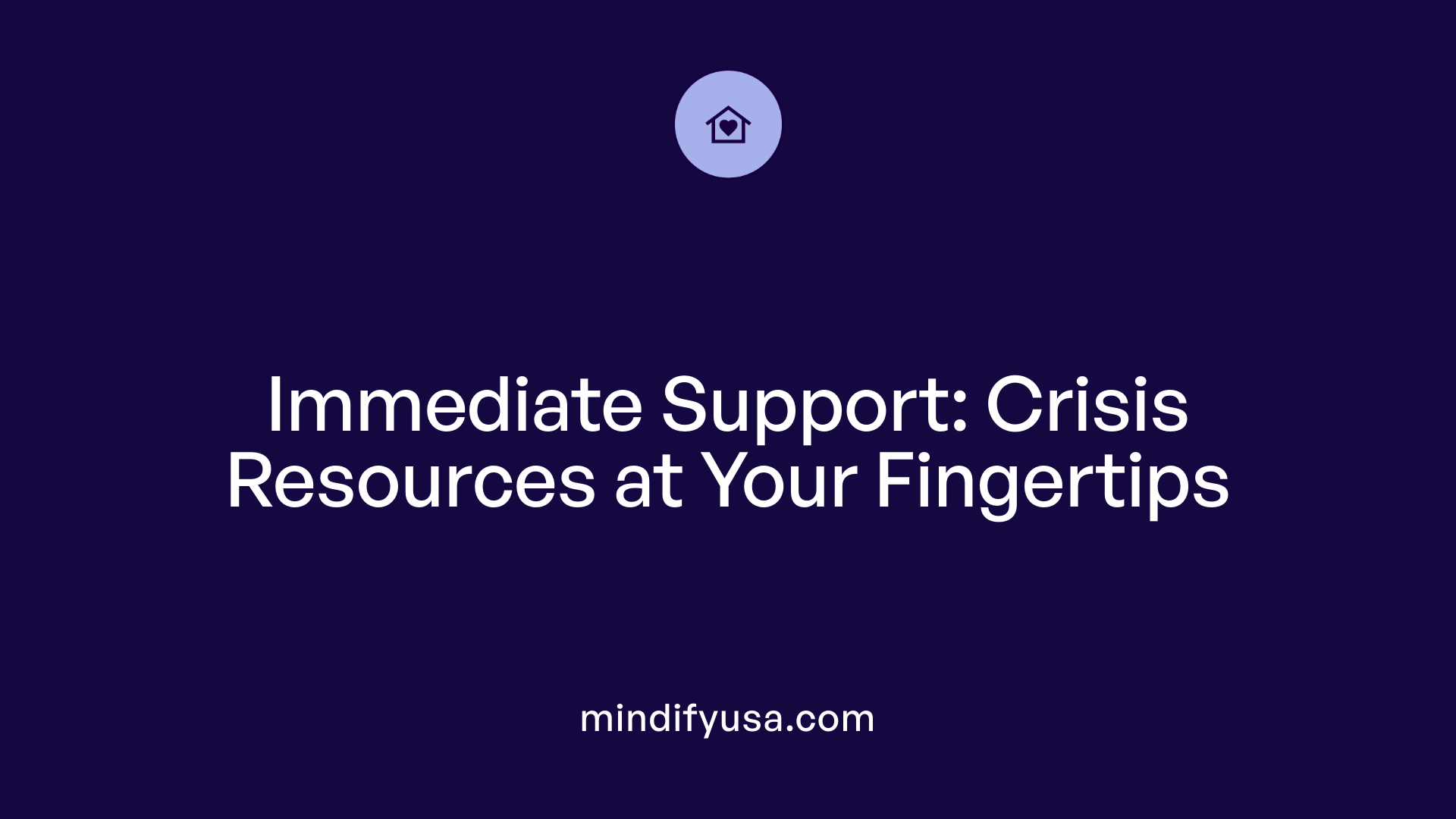
What is the 988 Suicide & Crisis Lifeline and how does it support crisis intervention?
The 988 Suicide & Crisis Lifeline is a vital resource provided to offer immediate crisis support. Anyone experiencing mental health emergencies like anxiety or depression can access this lifeline for timely assistance. Its accessibility ensures people in distress get urgent support without delay, which is crucial for effective crisis intervention.
How available are crisis intervention services?
Crisis intervention services are widely available through various channels, including helplines like 988, online resources, and local treatment referrals. These services emphasize quick response and support tailored to an individual's situation, making professional help reachable when it is needed most.
What campaigns and prevention initiatives support mental health?
SAMHSA promotes prevention and support via campaigns such as Substance Use & Misuse Prevention Month and RecoverMe. These initiatives focus on educating the public and connecting individuals, especially young adults, with helpful support networks and treatment options. Prevention efforts aim to reduce the onset of substance use issues and mental health challenges through community engagement.
What resources are offered for young adults?
Young adults receive targeted support through specialized programs linked to national campaigns. These programs provide education on substance use risks, mental health awareness, and navigating treatment options. Additionally, easy access to crisis lifelines and referral services allows young adults to find help confidentially and efficiently.
Lifestyle and Holistic Approaches Supporting Medication Management
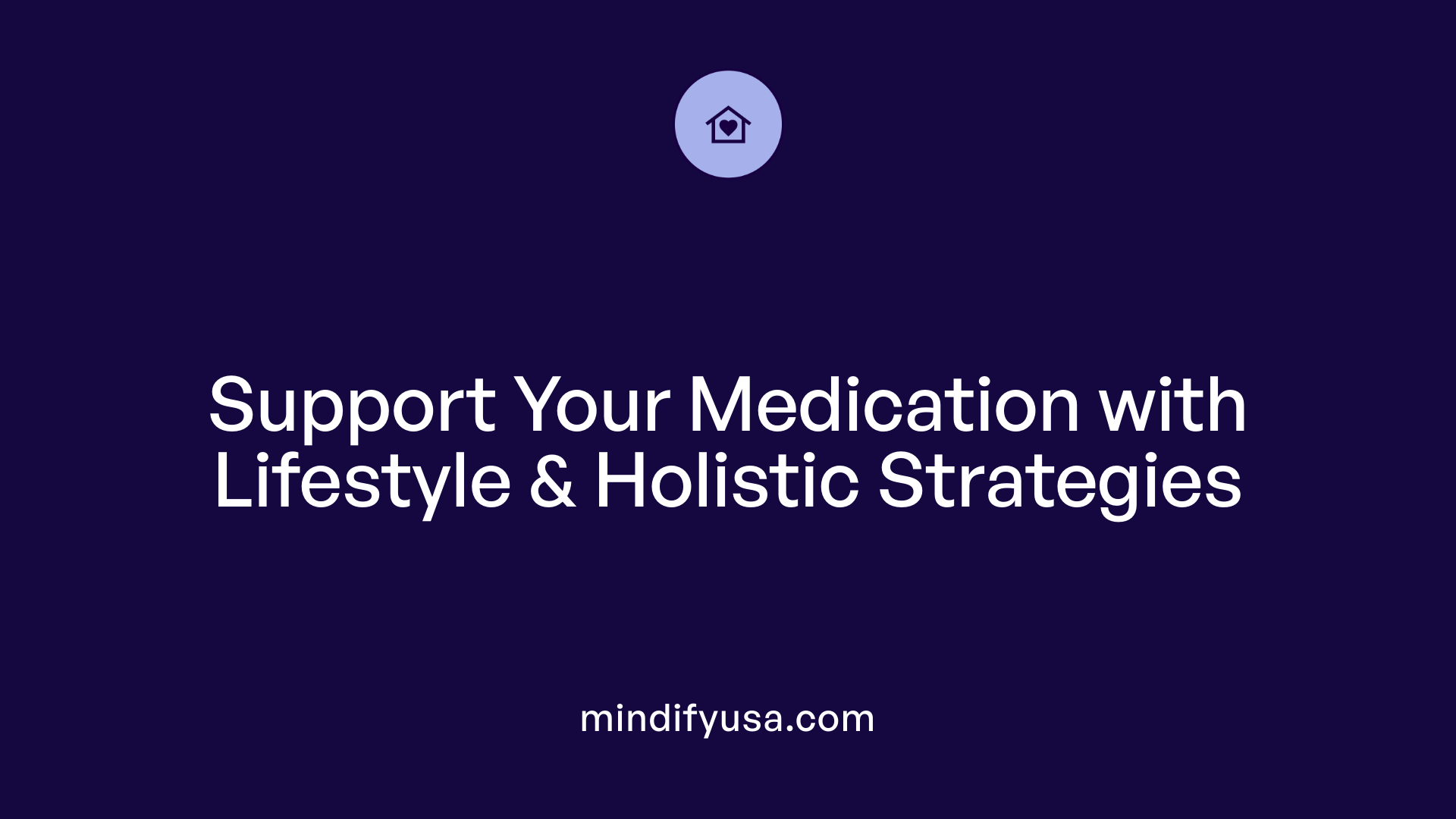
Why Are Lifestyle Factors Important in Medication Management?
Lifestyle factors such as diet, sleep, and stress management play a crucial role in supporting the effectiveness of mental health medications. These factors can influence how well medications work and impact overall treatment outcomes. By maintaining healthy habits, individuals can enhance their response to prescribed therapies and reduce the likelihood of side effects.
How Do Social Connections and Joyful Activities Help?
Staying socially connected and engaging in enjoyable activities are vital for emotional well-being. These practices provide emotional support, reduce feelings of isolation, and promote a positive mood. Joyful activities can serve as natural mood boosters and help individuals maintain motivation during treatment.
What Role Do Mindfulness and Resilience Play?
Mindfulness practices encourage present-moment awareness and reduce stress, which can positively affect mental health. Resilience-building helps individuals cope better with challenges, making them less vulnerable to relapse. Both mindfulness and resilience complement medication treatment by fostering a balanced and stable emotional state.
How Does Holistic Care Complement Medications?
Holistic care integrates lifestyle strategies with medication management for a comprehensive approach to mental health. This includes personalized medication plans alongside supportive therapies and lifestyle adjustments. Together, these approaches optimize treatment effectiveness, enhance quality of life, and promote long-term recovery.
Preparing Patients for Remote Medication Adjustment Consultations

What Are Patient-Centered Care Tips for Remote Sessions?
Patient-centered care emphasizes the importance of communication and comfort during remote medication adjustments. Patients should ensure a quiet, private space for the consultation to discuss their symptoms and side effects openly. Being honest about experiences with medications helps providers tailor treatments effectively.
How Should Patients Prepare for Their Remote Appointment?
Preparation includes listing current medications, noting any new or worsening symptoms, and keeping a record of lifestyle changes impacting health. Patients should test their technology (internet connection, camera, microphone) beforehand to avoid disruptions.
What Questions Should Patients Ask Their Healthcare Providers?
Patients can inquire about medication effectiveness, possible side effects, changes in dosage, and alternative therapies. Asking about how adjustments align with their daily routines or other conditions ensures personalized treatment.
What Can Patients Expect During Remote Evaluations?
Remote evaluations involve detailed interviews covering medical history, symptoms, and responses to treatment. Providers may guide patients through self-reporting tools and discuss therapy integration. Follow-up plans and next steps are clearly outlined to support ongoing care.
By preparing thoughtfully and engaging actively, patients and providers can collaborate successfully during remote medication management sessions, promoting safety and positive outcomes.
Future Directions: Enhancing Remote Mental Health Treatment and Medication Management
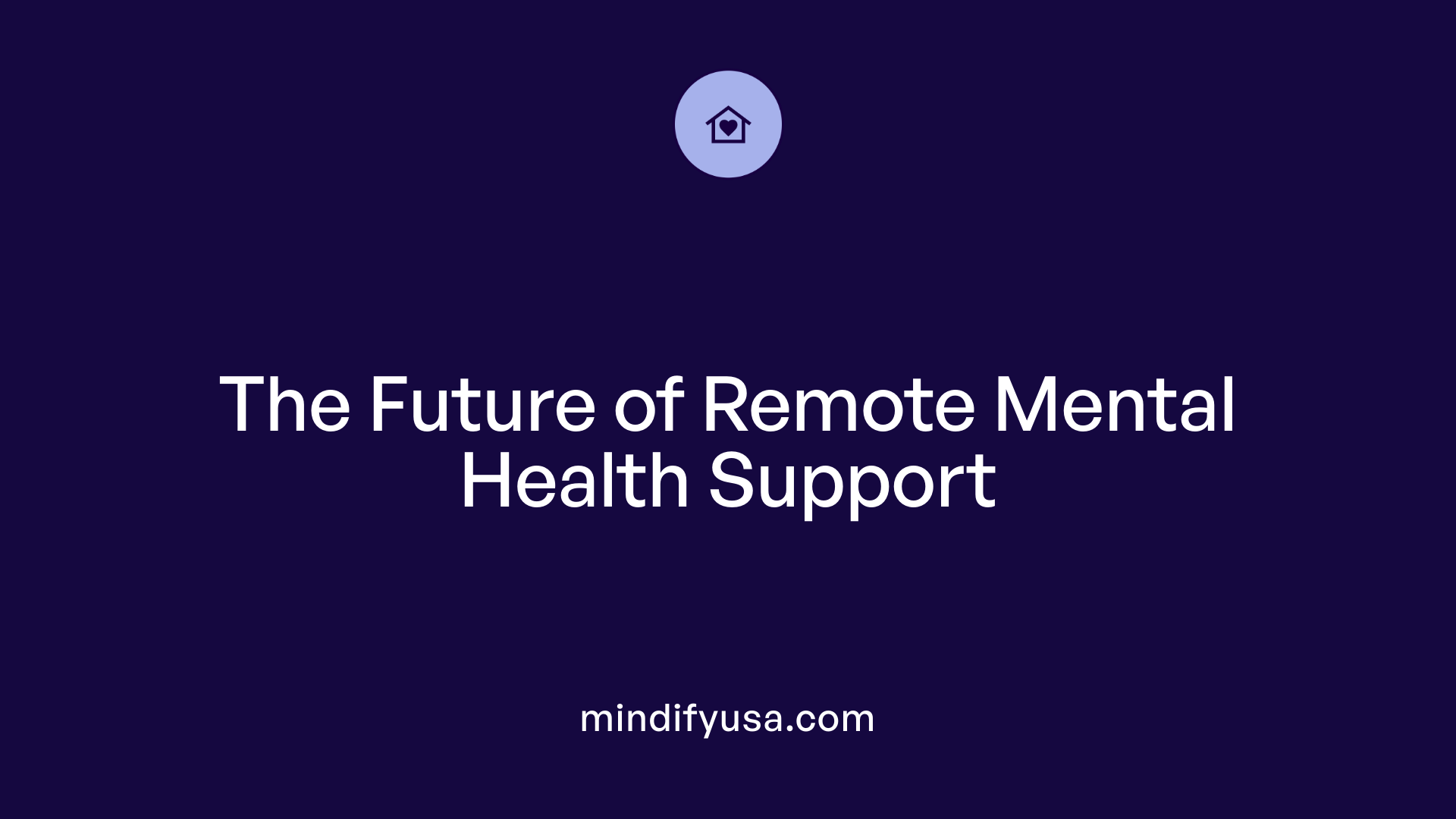
How are advances in telehealth technology shaping remote mental health care?
Telehealth has become a significant component of mental health treatment, especially highlighted during the COVID-19 pandemic. Large-scale studies demonstrate that remote treatment achieves comparable outcomes to in-person care, with similar reductions in depressive symptoms and improved quality of life. Importantly, patients receiving intensive treatments remotely tend to engage longer, hinting at telehealth's potential to enhance treatment adherence and continuity.
How can personalization through genetics and lifestyle data improve medication management?
Future medication management is moving toward more personalized approaches that incorporate genetic makeup, lifestyle, and co-occurring conditions. This customization can optimize treatment efficacy by tailoring dosages, medication types, and therapy combinations uniquely suited to each patient's biological and environmental context. Personalized care supports minimizing side effects and enhancing adherence, making treatments more effective.
What ongoing research and clinical guidelines are influencing this field?
Continuous research feeds into clinical guidelines that shape evidence-based practices in mental health medication management. Access to updated guidelines helps healthcare providers deliver treatments informed by the latest scientific understanding. These guidelines also emphasize the value of combined medication and psychotherapy treatments, ensuring holistic, patient-centered care aligned with evolving knowledge.
How is long-term recovery supported through remote methods?
Supporting long-term recovery remotely integrates medication management, psychotherapy, and lifestyle strategies such as mindfulness and social connectivity. Telehealth platforms provide accessible crisis intervention and routine follow-up, facilitating early intervention and sustained support. Regular monitoring through these platforms allows for timely adjustments and enhances coping strategies, promoting resilience and reducing the risk of chronic mental health conditions.
| Focus Area | Description | Impact on Mental Health Care |
|---|---|---|
| Telehealth Technology | Remote treatment delivering equal efficacy to in-person care | Increased access and longer treatment engagement |
| Personalized Medication | Use of genetic and lifestyle data to customize treatments | Improved efficacy, reduced side effects |
| Research & Guidelines | Continuous updates to clinical protocols incorporating recent study findings | Evidence-based, patient-centered approaches |
| Remote Long-Term Support | Integration of therapy, medication monitoring, and lifestyle support remotely | Sustained recovery and resilience with accessible care |
Balancing Life Changes with Remote Medication Support
Remote medication adjustment during significant life changes is a practical, effective approach to mental health care, offering personalized treatment tailored to the unique needs and circumstances of each individual. With comprehensive services, evidence-based medications, and integrated psychotherapy delivered via telehealth, patients gain access to continuous support even in crisis or transition. Ongoing monitoring, patient engagement, and holistic lifestyle strategies further enhance outcomes, empowering individuals to navigate emotional challenges successfully. As technology and clinical knowledge evolve, remote medication management promises to become an even more integral part of accessible, patient-centered mental health care.
References
- Home | SAMHSA - Substance Abuse and Mental Health ...
- Mental Health Medications - National Institute of Mental Health
- Adjustment Disorders: What They Are, Symptoms & ...
- Adjustment disorders - Diagnosis and treatment
- Medication Management in Mental Health
- Comparing efficacy of telehealth to in-person mental health ...
- Psychiatry / Mental Health





































































































